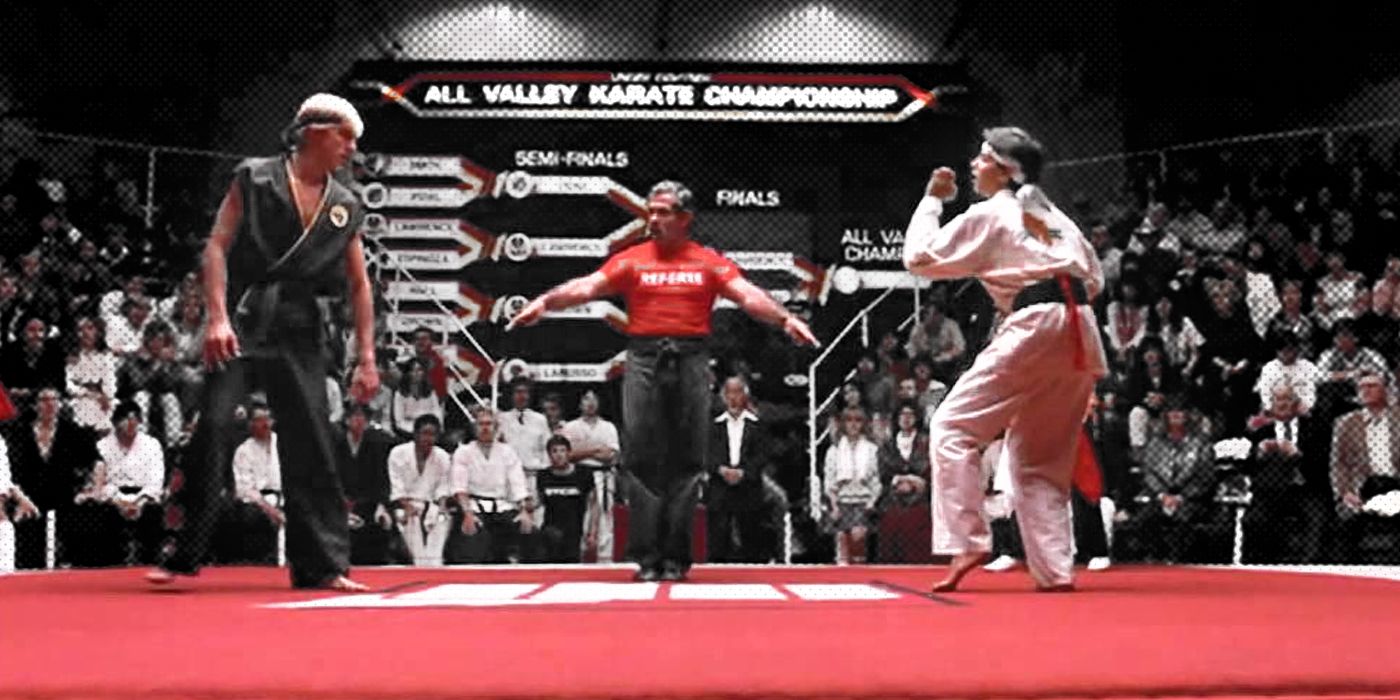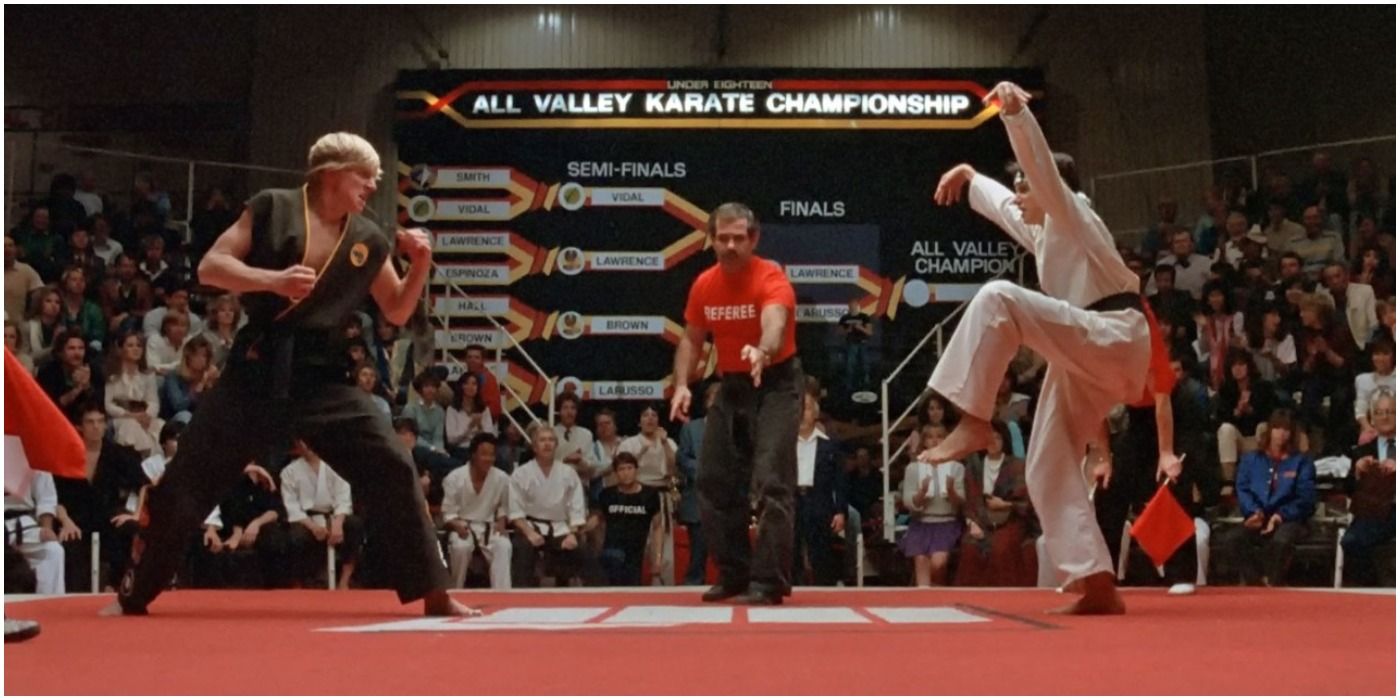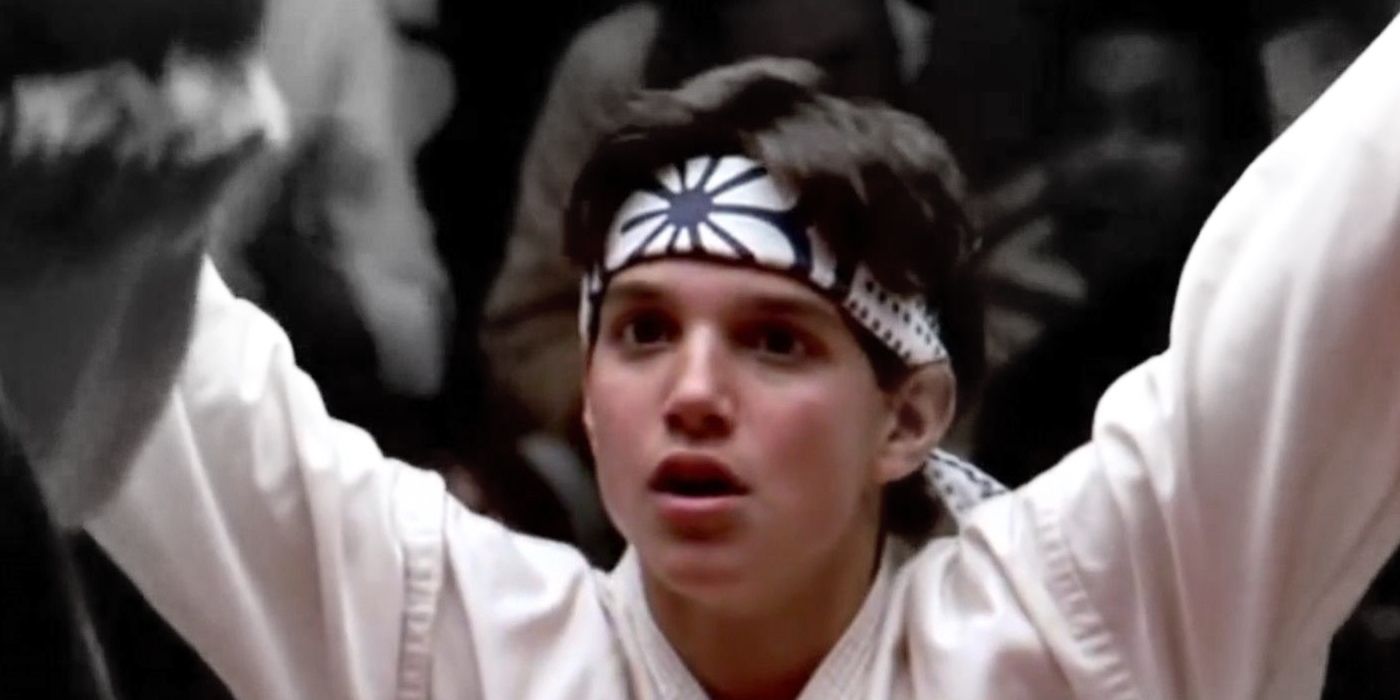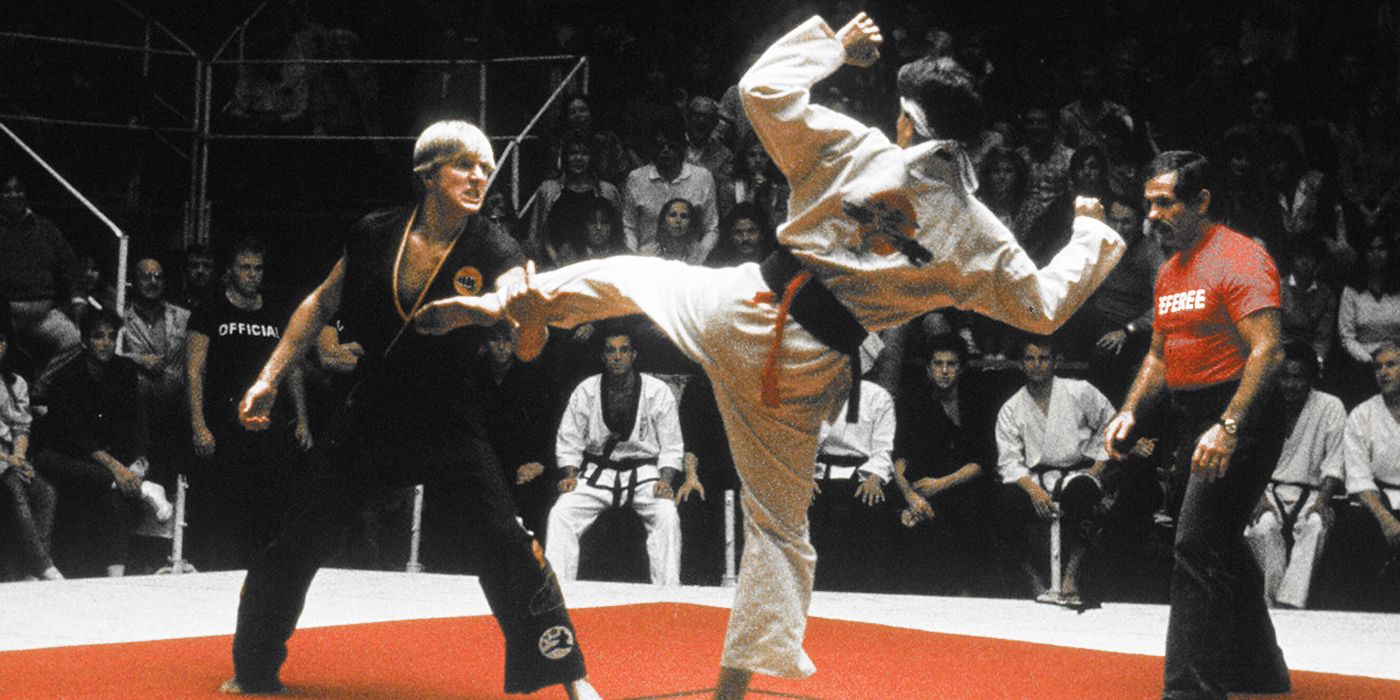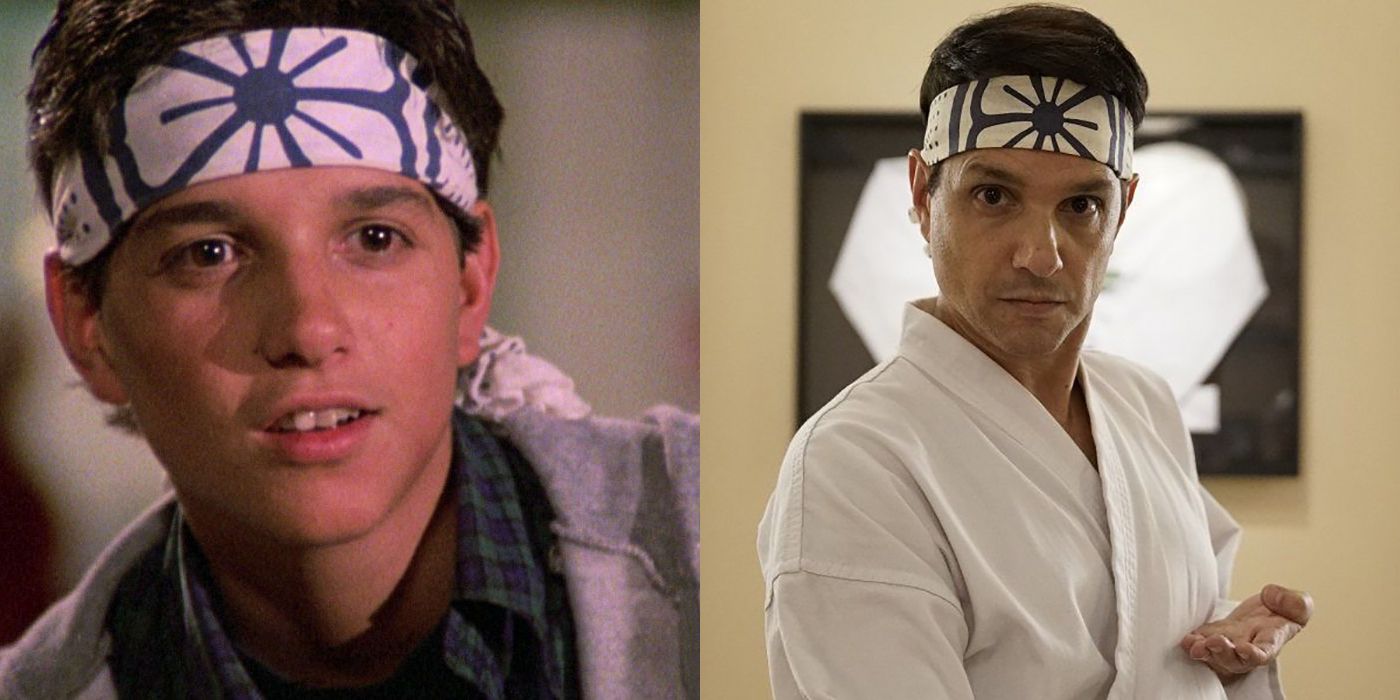The sequel series Cobra Kai renews the rivalry between Karate Kid characters Johnny Lawrence and Daniel LaRusso, with the former lamenting multiple times that the latter's iconic Karate Kid crane kick in the original movie was an illegal move. Johnny isn't just a sore loser, however, and multiple people agree. In fact, long before Cobra Kai, Barney Stinson made the argument on the sitcom How I Met Your Mother. Lawrence and LaRusso actors Will Zabka and Ralph Maccio even appeared to keep the debate going across their many HIMYM cameos. However, is there a basis to the claim that the Karate Kid kick is illegal?
Although it appears that Daniel and Johnny haven't seen themselves for years when Cobra Kai begins, a number of chance events lead to them encountering each other as adults. Johnny is at an all-time low when he finds himself face-to-face with his former rival in the series premiere. It makes sense for the once-Cobra Kai dojo protégé to have held a grudge about the Karate Kid crane kick — which to him, arguably, changed the whole trajectory of his life (and based on Danny's karate-themed marketing for his car dealership, perhaps his life too). While he comes across as incredibly bitter — and Johnny does indeed hate Daniel disproportionately to what happened — the former Cobra Kai student does also have a point. Based on the tournament rules stated in the movies, as well as common rules for youth karate tournaments in real life, the match-winning move was indeed an illegal strike. This begs the question: why was Daniel awarded the win if the Karate Kid kick was illegal?
Why Daniel's Crane Kick in Karate Kid Was Illegal
The Karate Kid crane kick was an illegal move for two primary reasons. The first is the most often referenced in debates on whether Daniel cheated in Karate Kid — the fact that Daniel struck Johnny in the face. The referee in the movie lists strikes to the face as not permissible. While this doesn't mean that Daniel cheated and should have been disqualified, it does mean that he should not have been awarded a point for the strike (which he was). Even actor Ralph Macchio, who plays Daniel in the original trilogy and the sequel series, believes that the Karate Kid kick went against the rules, telling The Wrap, "No hits to the face was clearly something when the referee made the list of things what not to do."
Part of the problem interpreting the rules within the movie is that they seem inconsistent. Looking at rules in real-life karate tournaments can shed some light on the issue. Based on the real-life rules (via the USA National Karate-do Federation), it does seem that the move was illegal — but not because Johnny was hit in the face. Strikes to the face and front kicks are actually permitted according to these rules, as long as the strike isn't open palmed. Because the All Valley karate tournament is an under 18 contest, the only contact to the face allowed is a "jodan" kick with "skin touch" level of contact. In layman's terms, the competitor is only allowed to make light contact rather than land a physical blow. These tournaments are not UFC matches — the aim is not to injure your opponent. Competitors are graded on form and technique as much as anything else, and restraint can actually win a contest in this regard. In addition to Daniel's crane kick being a fictional move, it also was a full extension blow that dazed his opponent. According to the official USA-NKF rules, Daniel should have been given a warning or even a penalty.
Why It Doesn't Matter That The Crane Kick Was Illegal
Ultimately, it doesn't matter if Daniel's crane kick in The Karate Kid defied real-life rules — because so many of the events in the movie's climactic fight scene are entirely fictional. Director John G. Avildsen wasn't trying to make a documentary about real-life karate tournaments, he was filming the climax to a blockbuster movie. Many stipulations of real-life martial arts tournaments were ignored because they would have made The Karate Kid less entertaining. In addition to the general sportsmanship requirements that would have cost Cobra Kai significant points for their behavior (the rules award points for things like "sporting attitude" and "good form"), attacks targeting joints are specifically prohibited. The repeat strikes by Cobra Kai competitors to Daniel's knee in particular would have resulted in warnings, penalties, and, eventually, disqualification.
Furthermore, it is highly unlikely that the teenage Daniel would have been allowed to compete while he was so visibly injured. There are provisions in the rules for injuries, including the requirement of an assessment to determine if each competitor is fit to fight. This includes provisions specifically for injuries resulting from "cumulative effect of injury sustained in an earlier bout." These are strictly adhered to, especially for under-18 bracket contests. Not only are the risks of injury very real, but liabilities, insurance, and the litigious tendency many have mean sporting bodies are especially cautious. Not only would concern for Daniel's own well-being have led to a real-life disqualification on injury grounds, but worries his parents would take legal action would also factor in. Despite Mr. Miyagi's healing reiki touch, Daniel was still injured from the previous rounds — something the judges and referees had just witnessed. If The Karate Kid happened in real life, the legality of Daniel's crane kick wouldn't be a debate, because he'd have never been allowed to step back up to the mat to make it. This would have made for a pretty bland finale to the movie, and also demonstrates why the technicalities of real-life karate contests shouldn't have too much bearing on how the fictional tournament in The Karate Kid is assessed.
Why Daniel Won The All Valley Championship
From a narrative perspective, it makes sense for the crane kick to be Daniel's finishing move. The technique is a Mr. Miyagi specialty, and thus, the young student mastering it in such a climactic way represents Daniel's journey as a student. Because the technique is specific to Miyagi-do karate, there is the additional symbolic meaning too — that the gentle ethical training of Miyagi-do is superior to John Kreese's "no mercy" teachings at Cobra Kai. Even within the Karate Kid world, the win makes sense. Eschewing the real-life rules, one could still argue that the movies establish facial strikes as illegal. However, given how unsportsmanlike the Cobra Kai conduct had been, it's completely believable that the judges and referees would ignore Daniel's one violation and award the trophy to the most deserving competitor. Ultimately, Johnny got what he deserved.
Cobra Kai has at least dealt with the problems with Daniel's win, and the sequel series dares to challenge audiences regarding the franchise's glorification of violence. Season 2 ends with a dojo war with far more tragic consequences than anything that happened in the beloved '80s movies. That said, the original movie had a very different kind of message in mind for its viewers: an underdog story that inspired viewers to stand up to their fears and overcome them. Therefore, it doesn't matter if the oft-used Karate Kid crane kick was illegal. In an interesting metafictional turn, the chief referee in The Karate Kid was played by Pat E. Johnson, who actually formulated the penalty point system used for American karate tournaments (via Martial Arts Action & Entertainment). Johnson was involved in all of the film's fight choreography, and would have been acutely aware of what was and was not allowed in such a tournament. If Johnson was alright with Daniel besting Johnny with a crane kick to the face in The Karate Kid, then perhaps audiences should be too.
Illegal Or Not, Daniel LaRusso Never Stopped Crane Kicking
While the Karate Kid kick isn't the only illegal move that Daniel-san gets away with in both The Karate Kid and Cobra Kai, he kept using the move far into adulthood. The original 1980s film isn't the only time that LaRusso breaks out the famous move, and it was most recently seen in Danny's epic battle with Terry Silver in Cobra Kai season 5. The sequel, The Karate Kid 2, sees another crane kick when Daniel fights Chozen in Okinawa during the O-bon dance festival. This was the one and only time Danny LaRusso's signature crane kick actually failed, as Chozen ended up avoiding the blow altogether. Though not used by Daniel, Miguel used the crane kick in Cobra Kai season 1 in the finals of the All Valley tournament. Fans had to wait 5 seasons to see the adult Daniel-san bust out the iconic move though, in the aforementioned fight against Terry Silver at the end of Cobra Kai season 5. In fact, the Miyagi-do crane kick is such a famous move within the Karate Kid universe that it's referenced multiple times throughout the movies and Cobra Kai, though it's yet to be seen if it will pop up in the 2024 Karate Kid reboot.
In the end, it obviously doesn't matter if the famous Karate Kid kick is illegal within the realm of under-18 karate tournaments. Movies don't have to follow the rules of real life, as long as there is narrative reason behind those choices. Daniel ultimately needed a unique and showstopping move to defeat the bully Johnny and Cobra Kai once and for all — and the crane kick perfectly filled this need. The move has become so iconic that it's referenced almost every time there's a spoof martial arts training montage in a movie or show. The obvious plot hole is that the rules around moves like the crane kickare mentioned in The Karate Kid, and then immediately broken when Daniel wins the tournament with one. However, the move itself is synonymous with the Karate Kid franchise, so much so, that it made its way into Cobra Kai. Chances are, Daniel-san and the rest of his dojo will continue to use the crane kick and to great results. So, in the end, audiences will remain happy.

